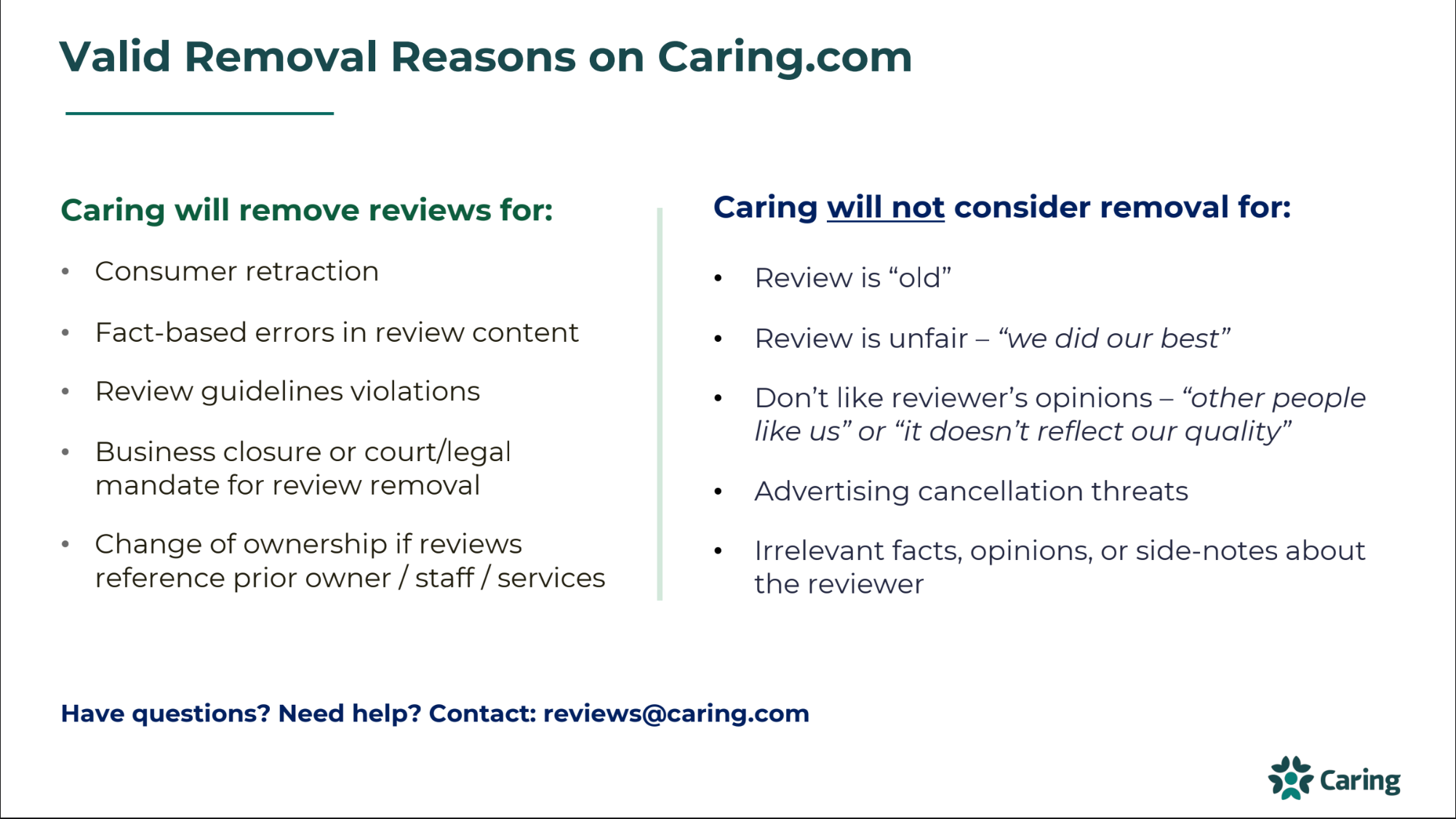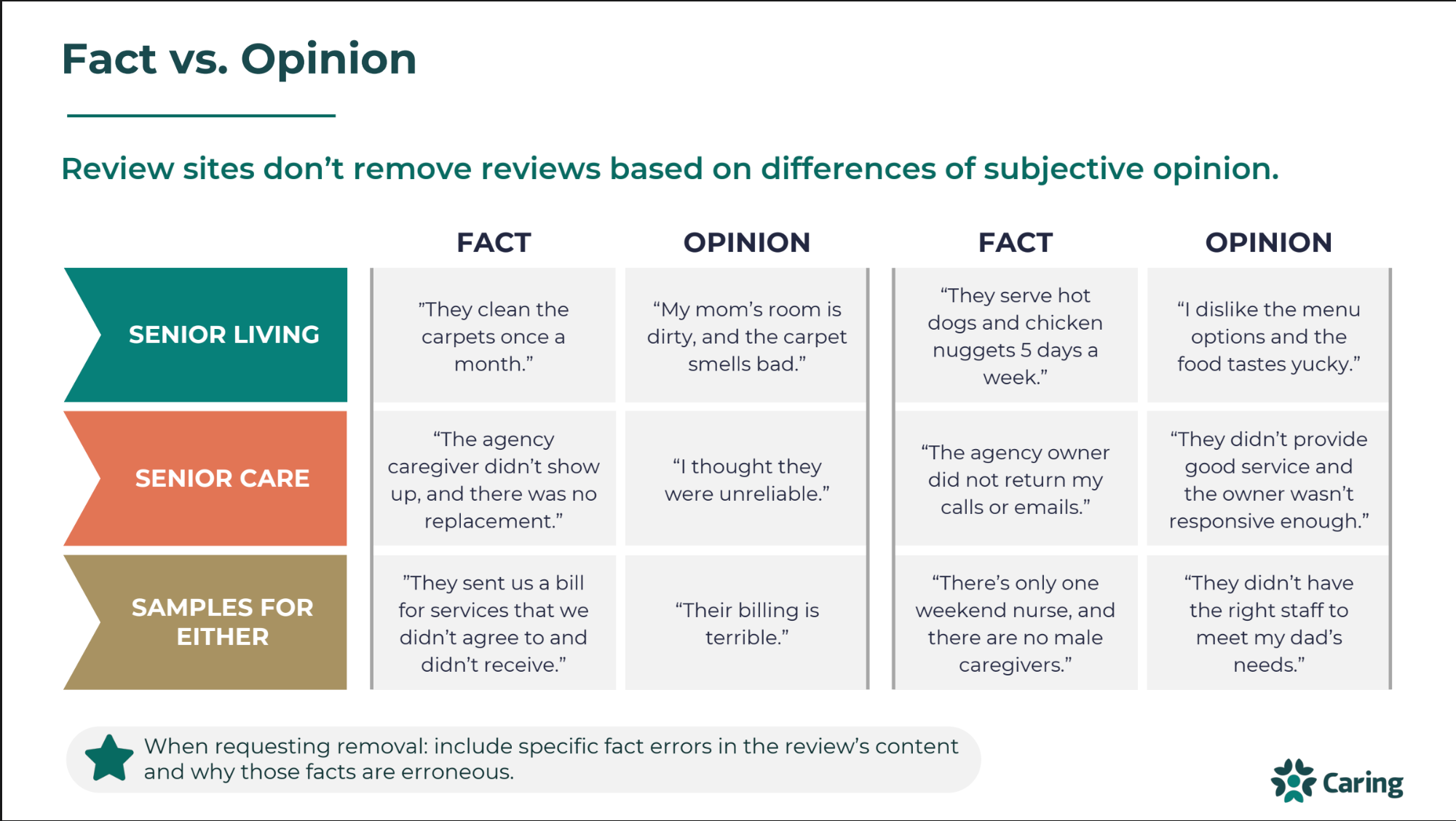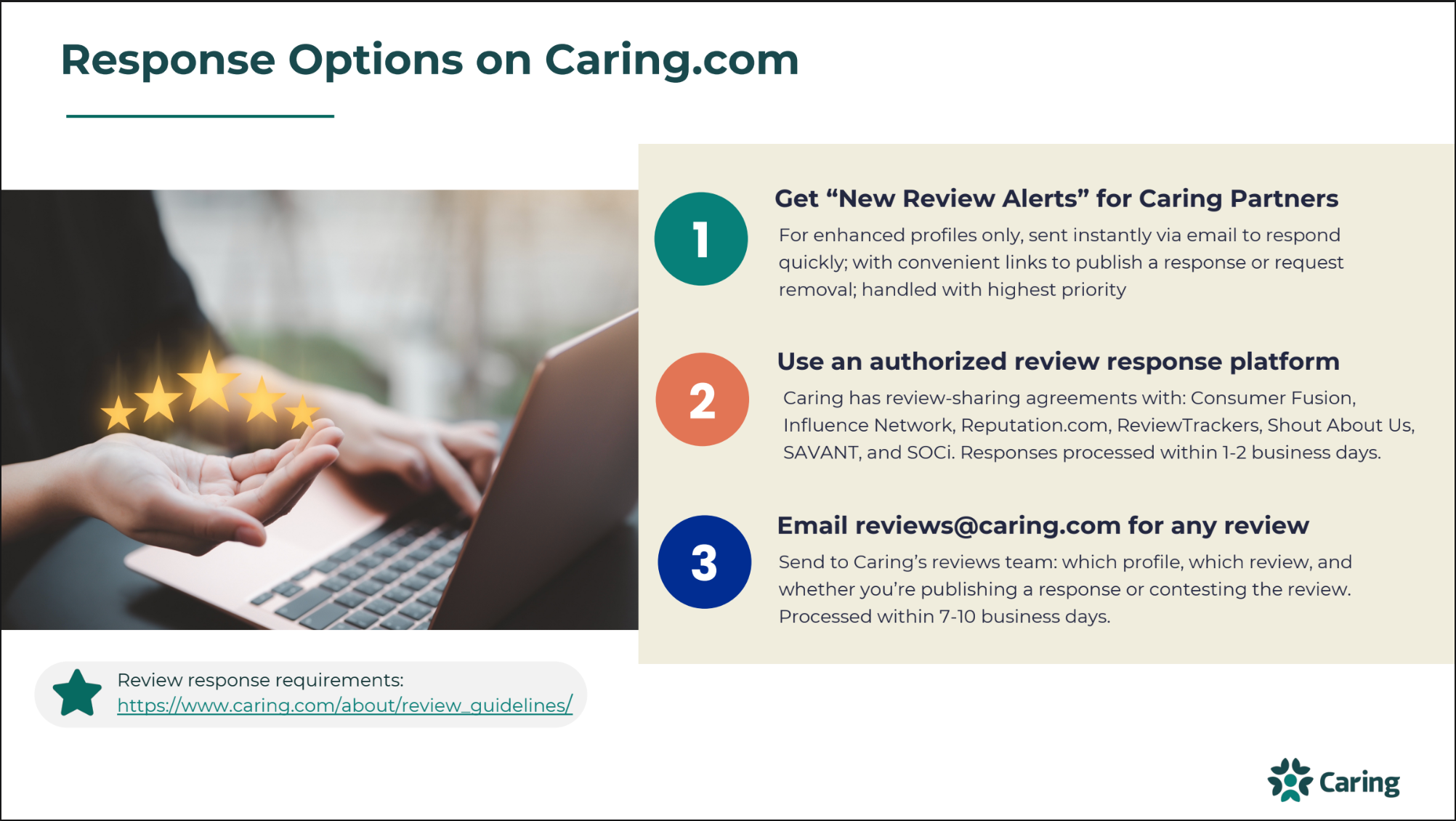Ratings & Reviews
Essential Strategies for Responding to Reviews about Senior Living and Senior Care

In today’s digital landscape, with care seekers turning to online resources to research and select senior living communities and senior care agencies: responding to service feedback in online reviews is crucial for your sales and marketing success.
In fact, seniors and their families are more likely to engage with businesses that actively manage their online reputation. Research from BrightLocal indicates:
88% of U.S. consumers are likely to use a business that responds to both positive and negative reviews.
If you only have time to respond to negative ones: 58% will remain likely to use your business.
If you fail to publish responses to reviews: Almost half (47%) have said they won’t use your business.
Responding to online reviews can also help you further build your reputation. A study by Harvard Business Review demonstrated that within six months of actively responding to reviews, businesses can see an increase in both the volume of reviews and their overall average rating. This improvement can lead to greater engagement and success.
Also keep in mind: to be considered for the annual Caring Stars award, communities and agencies must publish a response to all 1-star or 2-star negative reviews on their Caring.com listing (or effectively contest and remove them) by the qualification deadline of October 15th.
Now that you understand why it’s important to actively manage your online reputation, let’s outline some key strategies to help you be most effective in doing so, culled from our March 2024 webinar, “Feedback Finesse.”
Establish a Plan & Tools for Monitoring Reviews
There are tools and processes that can help you monitor reviews at scale. Here are three key ways to do this:
1. Automated, instant alerts — Some review sites offer this service via email when a new review is posted. Caring partners, for instance, receive New Review Alert emails with a convenient link to publish a response, no login required, and priority processing.
Tip: Determine where you want to focus your efforts, where you’re getting the most reviews, and which sites are ranking highest or are easiest for your potential customers to find and read the reviews. Then reach out to learn more about your alert options for those sites.
And: Starting in August 2024, Caring added review monitoring and respond in Partner Portal.
2. A monitoring software subscription — There are reputation management platforms that help businesses monitor their reputation across multiple websites — use one that has legitimate integrations with the reviews’ websites and isn’t just scraping the reviews off the web. These platforms typically have other services like reputation analysis too. They’re particularly good for larger businesses with many locations.
Tip: Caring has authorized reviews-sharing agreements with Consumer Fusion, Influence Network, Reputation.com, ReviewTrackers, Shout About Us, SAVANT, and SOCi. Communities and agencies can use these platforms to easily respond to reviews on Caring.com.
3. Manual tracking — If you can’t get alerts and you don’t have a subscription to a monitoring platform, you can keep a spreadsheet of your online profiles and periodically check them for new reviews. This is the most time-intensive, slowest, and least effective option, but it is a workaround if you can’t take advantage of other solutions.
Tip: If you’re not a Caring partner, and aren’t using one of the platforms we’re integrated with, you can still respond to reviews on your business listing. Simply email reviews@caring.com.
Decide How You’ll Respond
When you get a new review, ask yourself some questions to determine the best course of action: publish a public response or request review removal?
Have you read the review guidelines for the website? (Here are the Caring.com Reviews Guidelines.) Do you see anything in the review’s content that you think doesn’t meet the guidelines? If so, flag it to the site for re-evaluation and possible removal.
Here are valid vs. invalid reasons for getting a review removed from Caring.com:

If contesting a review on Caring.com for factual inaccuracy, we ask that you provide substantive counterfacts. We don’t remove reviews based on differences of subjective opinions, so here’s a chart to help you discern fact-based vs. opinion-based content:

If there are no valid removal reasons, take the opportunity to publish a response:

Whether you publish a response or request review removal, online reviews can also offer your business a window into customer sentiments, and opportunities to evaluate your business strengths and areas for improvement. These insights — even the painful ones — can help you further enhance your services and grow your business.
Do’s & Don’ts of Publishing Responses
When responding to reviews, remember to follow best practices to maintain professionalism and effectiveness:
Thank the reviewer for their feedback.
Be empathetic, conversational, and authentic — demonstrate service excellence and your humanity in a person-centered, care-oriented business.
Offer to discuss any issues directly, offline.
Don’t share private healthcare details or personal information in your response. Keep HIPAA in mind.
Don’t make disparaging remarks about the reviewer, such as comments about their personal habits or financial management.
Avoid debating the feedback or being defensive about negative reviews. Recognize that the feedback may be more about the circumstances of the reviewer than the business receiving the review — this is especially relevant and important during times of grief. Avoid taking it personally, while also avoiding blaming the reviewer or being dismissive of their feedback.
Maintaining a professional tone and addressing concerns constructively can enhance your business’s image and encourage more positive interactions. Our review response webinar provides example responses published on Caring.com for both positive and negative reviews, and tips for how to use AI tools like ChatGPT to help you craft well-written responses.
Review responses for Caring.com must also adhere to our review response guidelines — avoiding libel and privacy violations, and including specific fields of information (such as who specifically at your organization is responding on behalf of the organization).
Help is Available and This is Worth Your Attention
Responding to online reviews is not just a reactive measure but a proactive strategy that can significantly impact your business’s reputation and customer engagement. By actively managing your online presence, addressing customer feedback constructively, and adhering to best practices, you can foster a positive image and drive greater success.
For more information or help with review responses, please contact reviews@caring.com.
You May Also Like This
Ratings & Reviews
Essential Strategies for Responding to Reviews about Senior Living and Senior Care

In today’s digital landscape, with care seekers turning to online resources to research and select senior living communities and senior care agencies: responding to service feedback in online reviews is crucial for your sales and marketing success.
In fact, seniors and their families are more likely to engage with businesses that actively manage their online reputation. Research from BrightLocal indicates:
88% of U.S. consumers are likely to use a business that responds to both positive and negative reviews.
If you only have time to respond to negative ones: 58% will remain likely to use your business.
If you fail to publish responses to reviews: Almost half (47%) have said they won’t use your business.
Responding to online reviews can also help you further build your reputation. A study by Harvard Business Review demonstrated that within six months of actively responding to reviews, businesses can see an increase in both the volume of reviews and their overall average rating. This improvement can lead to greater engagement and success.
Also keep in mind: to be considered for the annual Caring Stars award, communities and agencies must publish a response to all 1-star or 2-star negative reviews on their Caring.com listing (or effectively contest and remove them) by the qualification deadline of October 15th.
Now that you understand why it’s important to actively manage your online reputation, let’s outline some key strategies to help you be most effective in doing so, culled from our March 2024 webinar, “Feedback Finesse.”
Establish a Plan & Tools for Monitoring Reviews
There are tools and processes that can help you monitor reviews at scale. Here are three key ways to do this:
1. Automated, instant alerts — Some review sites offer this service via email when a new review is posted. Caring partners, for instance, receive New Review Alert emails with a convenient link to publish a response, no login required, and priority processing.
Tip: Determine where you want to focus your efforts, where you’re getting the most reviews, and which sites are ranking highest or are easiest for your potential customers to find and read the reviews. Then reach out to learn more about your alert options for those sites.
And: Starting in August 2024, Caring added review monitoring and respond in Partner Portal.
2. A monitoring software subscription — There are reputation management platforms that help businesses monitor their reputation across multiple websites — use one that has legitimate integrations with the reviews’ websites and isn’t just scraping the reviews off the web. These platforms typically have other services like reputation analysis too. They’re particularly good for larger businesses with many locations.
Tip: Caring has authorized reviews-sharing agreements with Consumer Fusion, Influence Network, Reputation.com, ReviewTrackers, Shout About Us, SAVANT, and SOCi. Communities and agencies can use these platforms to easily respond to reviews on Caring.com.
3. Manual tracking — If you can’t get alerts and you don’t have a subscription to a monitoring platform, you can keep a spreadsheet of your online profiles and periodically check them for new reviews. This is the most time-intensive, slowest, and least effective option, but it is a workaround if you can’t take advantage of other solutions.
Tip: If you’re not a Caring partner, and aren’t using one of the platforms we’re integrated with, you can still respond to reviews on your business listing. Simply email reviews@caring.com.
Decide How You’ll Respond
When you get a new review, ask yourself some questions to determine the best course of action: publish a public response or request review removal?
Have you read the review guidelines for the website? (Here are the Caring.com Reviews Guidelines.) Do you see anything in the review’s content that you think doesn’t meet the guidelines? If so, flag it to the site for re-evaluation and possible removal.
Here are valid vs. invalid reasons for getting a review removed from Caring.com:

If contesting a review on Caring.com for factual inaccuracy, we ask that you provide substantive counterfacts. We don’t remove reviews based on differences of subjective opinions, so here’s a chart to help you discern fact-based vs. opinion-based content:

If there are no valid removal reasons, take the opportunity to publish a response:

Whether you publish a response or request review removal, online reviews can also offer your business a window into customer sentiments, and opportunities to evaluate your business strengths and areas for improvement. These insights — even the painful ones — can help you further enhance your services and grow your business.
Do’s & Don’ts of Publishing Responses
When responding to reviews, remember to follow best practices to maintain professionalism and effectiveness:
Thank the reviewer for their feedback.
Be empathetic, conversational, and authentic — demonstrate service excellence and your humanity in a person-centered, care-oriented business.
Offer to discuss any issues directly, offline.
Don’t share private healthcare details or personal information in your response. Keep HIPAA in mind.
Don’t make disparaging remarks about the reviewer, such as comments about their personal habits or financial management.
Avoid debating the feedback or being defensive about negative reviews. Recognize that the feedback may be more about the circumstances of the reviewer than the business receiving the review — this is especially relevant and important during times of grief. Avoid taking it personally, while also avoiding blaming the reviewer or being dismissive of their feedback.
Maintaining a professional tone and addressing concerns constructively can enhance your business’s image and encourage more positive interactions. Our review response webinar provides example responses published on Caring.com for both positive and negative reviews, and tips for how to use AI tools like ChatGPT to help you craft well-written responses.
Review responses for Caring.com must also adhere to our review response guidelines — avoiding libel and privacy violations, and including specific fields of information (such as who specifically at your organization is responding on behalf of the organization).
Help is Available and This is Worth Your Attention
Responding to online reviews is not just a reactive measure but a proactive strategy that can significantly impact your business’s reputation and customer engagement. By actively managing your online presence, addressing customer feedback constructively, and adhering to best practices, you can foster a positive image and drive greater success.
For more information or help with review responses, please contact reviews@caring.com.

